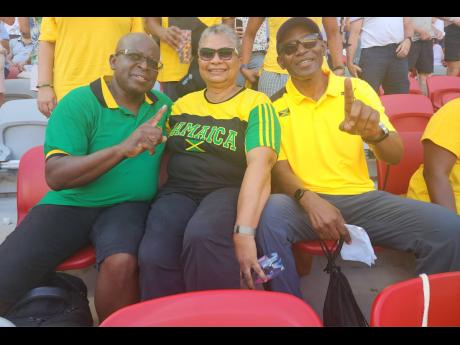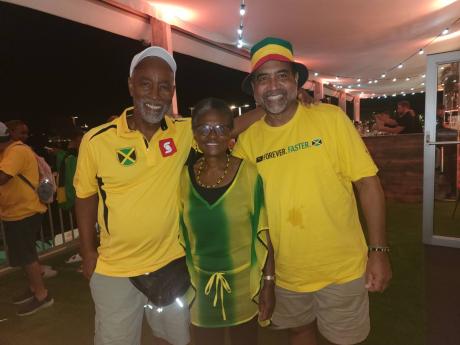Back to Budapest
J’can group returns to support athletes years after studying in Hungarian city
BUDAPEST, Hungary: Hundreds of Jamaicans from across the world have lit up the Budapest Stadium in Hungary with the black, green and gold of their homeland. The islanders have been a hit with the international community, but one group in...
BUDAPEST, Hungary:
Hundreds of Jamaicans from across the world have lit up the Budapest Stadium in Hungary with the black, green and gold of their homeland.
The islanders have been a hit with the international community, but one group in particular stands out.
Eight Jamaicans, from a larger group of 40 who studied in Hungary between the 1970s and mid-1980s, have turned up at the World Athletics Championships in support of their countrymen and women.
The eight – dentists Emerson Henry and Juliet Smith-Edwards; psychiatrist Dr Winston De La Haye; veterinarians Dr Cedric Lazarus and Locksley Messam; engineers William Woolnough and Rosalie Deane, as well as her husband, architect Lincoln Deane, are attending the games at which Jamaica has already won three medals in the 100 metres and 110 metres hurdles.
“An opportunity like this we wouldn’t want to miss. But, in addition, we have meetings every five years and we attend those. For instance, I am here every two years, because we made such good friends. We love coming,” De La Haye, who spent six years in medical school in Budapest, told The Gleaner.
For him and his colleagues, they went to Budapest at a time when Jamaica was looking to build its educational capacity and strengthen its developmental goals. All 40 of them had to immerse themselves into the Hungarian language six days per week for a year before embarking on their respective courses.
LEARNING LANGUAGE
“No lack of knowledge of the language was going to stop us. Within three months I started dreaming in the language. And then after that, started speaking, because to use a language, you can’t be thinking and then translating from the language, by the time you finish a sentence, all five minutes gone,” Henry quipped as he too spoke with The Gleaner in the lobby of the Crowne Plaza Hotel.
By the end of his first year in Budapest, Henry said he was more than adequate in the language. Moreover, a lot of the medical terms were in Latin, which is close to English and a lot of the professors spoke English and they took pride in that.
“A lot of the exams were oral and the quality of the teaching was highly ranked,” he stated, adding that the Hungarians are well respected, owing to the many discoveries they have made in medicine.
It was a Hungarian who founded vitamin C and its incredible uses.
His comments were complemented by Lazarus, who said had it not been for Hungary, he probably would not have made it to veterinary school, because in those days only those who had money could afford to go to the United States to study and there were no vet schools in the Caribbean.
“When I came, there were only three other Jamaicans. The number moved up to seven in 1978, then 15. Overall about 40 Jamaicans by 1981.”
Lazarus was part of the second group that entered Hungary. He told The Gleaner his time spent there was challenging, yet exciting. Challenging because it was his first time experiencing winter and it was the Hungarians first time experiencing Jamaicans.
“Hungarians weren’t used to black people. So we had the challenge of educating them about us. They didn’t know where Jamaica was. They thought Jamaica was in Africa and never heard of Jamaica,” he explained.
In those days, said Lazarus, there wasn’t any cable or satellite television.
“They didn’t see a lot of black people on television. So it was challenging. People would stare at you on the streets, people would rub your hand to see if the blackness was real. People put their hand in the hair to see the curliness was real,” he reminisced.
MANLEY’S VISION
Lazarus said then Prime Minister Michael Manley was way ahead of his time, because it was his doing, getting scholarships for Jamaicans to study overseas in several different countries, including Czech Republic, Romania, Poland, Russia, Ukraine and Cuba.
“He had a vision that education could lift the country up. The more people you had educated, the better off we would be,” said the vet, who returned to Jamaica after his studies to work with the Ministry of Agriculture for 20 years.
All 40 members of the group returned to serve in their country at the end of their studies. Lazarus now resides in Canada where he works with the Federal Government in that country.
Smith-Edwards said when she got to Budapest in the late 1970s, she felt like she had died and gone to heaven because of how completely safe Hungary was. Crime was almost non-existent.
“In addition, they had free healthcare, free education, and housing. We didn’t have to worry about pickpockets, being attacked in our hostels or on the streets. I thought that there was no way I was going to die any time soon,” she told The Gleaner.
Transitioning to a life in this European country was easy for her.
“We learned to adapt to living amongst other people. We experienced a new culture. The people treated us with respect and dignity. This experience made us more confident to deal with the world. Most of us learned to cook as well when we needed to eat Jamaican foods.”
Smith-Edwards placed third in dentistry during her year in the programme and said she earned her scholarship from a Ministry of Education initiative tagged ‘Manpower Development’.
Through the programme, she said, she acquired a profession that allowed her to work in healthcare and give back to her community.
“I worked in the government clinics in the Kingston and St Andrew area for six years after returning to Jamaica from Budapest.”
This, she said, allowed the patients in the low socioeconomic groups to be served.
“Free education allows one to serve the poorer communities without having to worry about paying off student loans,” she explained.
The eight Jamaicans remain extremely proud of their country.
De La Haye was appointed chief medical officer of Jamaica between 2016 and 2018, and is currently teaching in the psychiatric department at The University of the West Indies in St Andrew.
Rosalie Deane and her husband, Lincoln, remain in Jamaica, where she is involved in real estate, while Woolnough resides in Canada.


